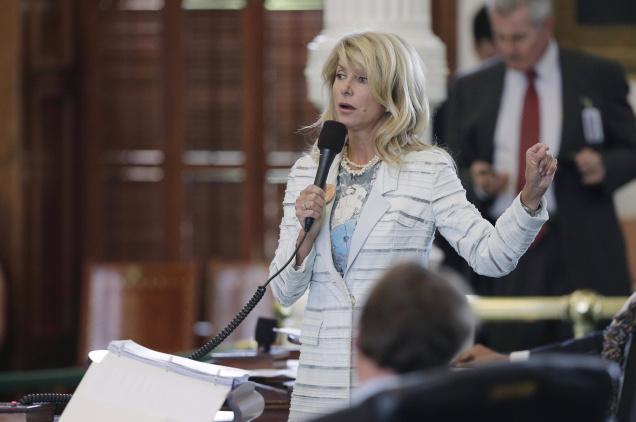 June 27;Senator Wendy Davis’s courageous — and successful —10 hour 45 minute bid to block a law that would have radically restricted access to abortion in Texas by talking was a wonder to behold. But it was by no means the longest filibuster history has seen, even in America.
June 27;Senator Wendy Davis’s courageous — and successful —10 hour 45 minute bid to block a law that would have radically restricted access to abortion in Texas by talking was a wonder to behold. But it was by no means the longest filibuster history has seen, even in America.
Seen by its proponents as an important check on power and by critics as an infuriating waste of time, the filibuster — from the Spanish filibustero, or freebooting — is an attempt by a minority political party to stall a bill, and hopefully prevent a vote, by endlessly debating it.
The tradition dates back to at least Roman times; one of the earliest known practitioners, Cato the Younger, routinely spoke against legislation to which he objected until night fell, at which point — the Roman senate requiring all business to be concluded by dusk — a vote was impossible.
In Britain, the longest speech ever pronounced in the House of Commons (the U.K.’s lower elected house) — a six-hour effort on law reform by Henry Brougham, in 1828 — was, pleasingly, not even a filibuster. But the practice became common from the 1880s when Irish nationalists, led by Charles Stewart Parnell, started using it to force Parliament to take home rule seriously.
In February 1983, the Labour MP John Golding spoke for 11 hours 15 minutes about a minor amendment to the British Telecom privatisation bill; this undoubtedly helped delay the privatisation of the U.K.’s telephone operator until after the 1983 election, but the feat is often denied full filibuster status because it was performed in a standing committee, not in the House of Commons chamber, so Mr. Golding could take breaks.
Stricter standing orders were subsequently introduced to prevent this kind of thing; the longest Commons speech since was given by the Conservative MP Ivan Lawrence, who, on 5-6 March 1985, managed to speak for four hours 23 minutes against the Water Fluoridation Bill (friends have since told him that reading the transcript helps them get to sleep).
More recently, the Labour MP Andrew Dismore spoke for three hours 17 minutes in December 2005 to block a Conservative private member’s bill (a proposed law introduced by a member of a legislature who is not acting on behalf of the executive government) clarifying the force a householder can use against intruders; his performance, too, is not widely viewed as epic because he accepted multiple interventions from other MPs, thus artificially inflating the length of his speech.
Filibustering is a global phenomenon: in the Philippines, Senator Roseller Lim stood at the podium for just over 18 hours in April 1963 in a bid to prevent the election of Ferdinand Marcos to the senate presidency; he ended up being carried off on a stretcher, suffering exhaustion.
In December 2010, the Austrian Green MP Werner Kogler laid into the country’s ruling parties for 12 hours 42 minutes. Canadians are no slouches either: in 2011 the New Democratic party orchestrated a spectacular filibustering session that lasted a total of 58 hours.
‘Soul of the Senate’
But the true experts are to be found in the United States and particularly in the Senate during the past century. Senators may speak for pretty much as long as they like, on whatever topic they like, to prevent the final vote on a bill and the practice of filibustering is, consequently, sometimes called “the soul of the Senate”.
Elected representatives have been known to read lengthy sections of the phone book out loud; quote recipes for roquefort salad dressing; discuss how best to fry oysters; and cite the entire Declaration of Independence.
The all-time record is held by veteran South Carolina senator Strom Thurmond, who, starting at 8.54 pm on 28 August 1957 and finishing at 9.12 pm the following evening, spoke for precisely 24 hours 18 minutes against the notion that the vote should be extended to African-Americans. This involved reading aloud the voting laws of each U.S. state; the Bill of Rights; and George Washington’s farewell address along the way.
Not far behind Mr. Thurmond comes AI D’Amato of New York, who, in 1986, held forth for 23 hours 30 minutes to head off a vote on a major military bill (he didn’t like the fact it would have halted funding for a plane being built by a company based in his state).
Wayne Morse of Oregon, the so-called “Tiger of the Senate”, managed 22 hours 26 minutes to stall debate on an oil bill in 1953; while Robert La Follette Sr. of Wisconsin kept going for 18 hours 23 minutes in 1908 to talk out a bill that would have allowed the U.S. treasury to lend currency to banks during fiscal crises.
At a mere 15 hours and 30 minutes, the personal best one of the Senate’s most accomplished filibusterers, the Louisiana Democrat Huey Long, in June 1935, no longer makes it into the top three. But Mr. Long will long (as it were) be remembered for reading out his family’s favourite recipes, including a soup made of the water left over from boiled greens, known as potlikker.
Such astonishing feats of endurance are less common these days, the U.S. Senate seeking to head off filibusterers at the pass and many legislatures, including the U.S. House of Representatives, and both houses of the Australian Parliament, imposing strict rules on how long politicians can speak for.
Some commentators have also observed that in the era of 24-hour rolling news, elected representatives may be somewhat less willing to engage publicly in what a good proportion of their electorate may consider time-wasting. Which makes Wendy Davis’s achievement all the more impressive.
— © Guardian Newspapers Limited, 2013
